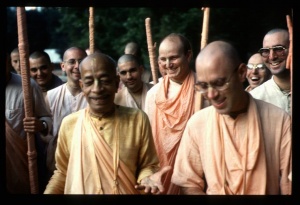CC Madhya 24.187

His Divine Grace
A.C. Bhaktivedanta Swami Prabhupada
A.C. Bhaktivedanta Swami Prabhupada
TEXT 187
buddhye rame ātmārāma—dui ta’ prakāra
’paṇḍita’ muni-gaṇa, nirgrantha ‘mūrkha’ āra
SYNONYMS
buddhye—in intelligence; rame—who enjoys; ātmārāma—is an ātmārāma; dui ta’ prakāra—two varieties; paṇḍita—learned; muni-gaṇa—philosophers; nirgrantha—without education; mūrkha—foolish; āra—also.
TRANSLATION
“Everyone has some kind of intelligence, and one who utilizes his intelligence is called an ātmārāma. There are two types of ātmārāmas. One is a learned scholar and philosopher, and the other is an uneducated, illiterate, foolish person.